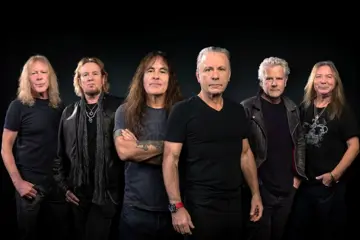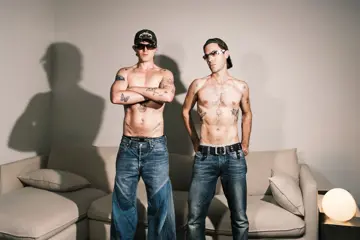CONTENT WARNING: This article contains discussion of suicide. If you are suffering from any of the issues that have been discussed or need assistance, please contact Lifeline on 13 11 14.
Whether it’s on stage or on the small screen, Cloncurry-born writer and actor Steven Oliver, a descendant of the Kuku-Yalanji, Waanyi, Gangalidda, Woppaburra, Bundjalung and Biripi peoples, finds humour in the everyday. His new play From Darkness combines tragedy and comedy in a darkly funny concoction that seeks to connect people. Playing as part of Brisbane Festival, From Darkness introduces Brisbane to Oliver’s interesting and deeply philosophical perspective on the world.
Described as “Family Matters meets Redfern Now meets The Exorcist”, From Darkness combines contemporary family life with ongoing notions of Aboriginal spirituality. The audience meets the characters of the play – a fractured family unit dealing with their individual demons – after the death of a son and brother. Oliver says that the presence of spirits in the play was not optional: “Spirits have always been there [for Aboriginal people]. It’s a part of who we are, a part of our make-up.”
Oliver believes that non-Aboriginal people could learn from Aboriginal values on connection – not only connection to culture but also the interconnection of land, body and spirit. Oliver says that Aboriginal people “understand where we belong, we understand our connectedness”. It’s this sense of connection that Oliver wishes to share through From Darkness by moving away from “what Aboriginal people think” to focus more on “how” Aboriginal people think.
Don't miss a beat with our FREE daily newsletter
In From Darkness, Oliver uses ideas around family and humour as a means of connection. “Family is another thing that connects us. It’s a universal thing,” Oliver says. The idea for From Darkness came from a conversation with his family. “We were talking about spirits and time travel and going back to change the time when Cook arrived,” Oliver says. “At the end of the day, all you can do is write what you know.”
The script evolved from that original seed of an idea. Oliver, who admits that his writing is “not formulaic”, says it is largely created from conversations that he hears. However, instead of a play about changing the history of colonial invasion, Oliver went on to create what he called “the most philosophical piece [he's] ever written”.
To bring From Darkness to the stage, Oliver had to hand his script over to his creative team, who could interpret his words in different ways. “I’m not precious, as long as the message of what I want to say is always there,” Oliver says. “When you wanna create [a project], other people help you create it. The directors, the actors – we create it together. You need to be surrounded by people who share your values… I love interpretation.”
The value of human connection to Oliver is made plain as he shares his philosophies about what it means to be human and how important it is to connect with other people, particularly those of different backgrounds to yourself. In a world where Aboriginal men are twice as likely to die by suicide than non-Aboriginal men and Aboriginal people are being imprisoned and dying in police custody at disproportionate rates, From Darkness deals with death, grief and suicide in a way that is relevant, hard-hitting and personal.
The idea of one person being seen as inferior in the eyes of another person based on colour or creed disturbs Oliver, who says, “To dehumanise others is to dehumanise ourselves because by dehumanising others we make a monster of ourselves.”
This sentiment echoes throughout our conversation with Oliver. “We live in cities of millions and people have never felt more lonely,” Oliver muses. “We allow suffering because we see war on the news and, because it’s not happening to us, we disconnect ourselves from it.”
Still, with all this grief and disconnect in the world, Oliver finds time to have a laugh. Comedy is often used as a “coping mechanism” in Aboriginal communities. Oliver says that talking to mob, “One minute they’ll be talking about something heavy and then they’ll crack a joke mid-sentence.
“As Aboriginal people, we deal with tragedy a lot. We’ve had to use comedy to cope. It’s about giving ourselves permission to laugh. Sometimes it’s all we can do.”















